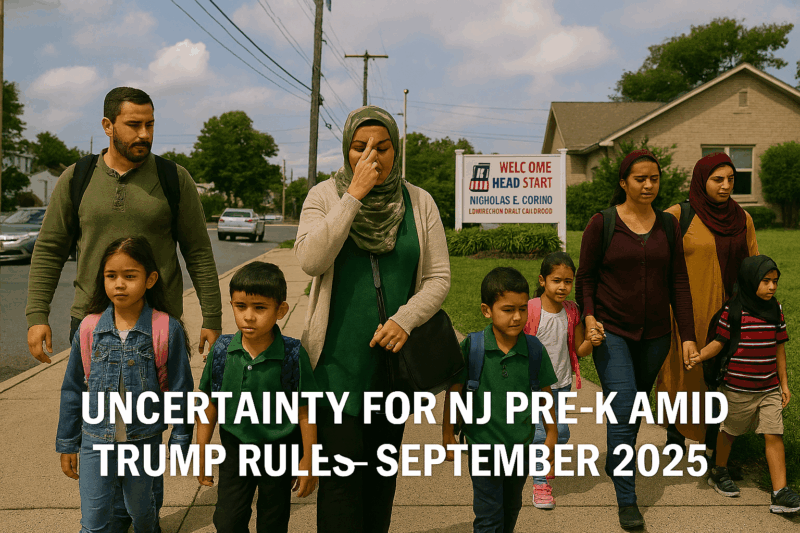Morning Rituals of Fear: A Mother’s Daily Dread
In the quiet suburbs of Mercer County, New Jersey, a Guatemalan mother of three begins each day with a sign of the cross—a simple prayer for protection amid the shadows of uncertainty. As an undocumented immigrant, her short drive to drop off her children at school feels like navigating a minefield, especially with ICE raids becoming a grim routine across the state. This personal anxiety mirrors the broader turmoil sparked by the Trump administration’s new immigration rules, which could force approximately 1,200 New Jersey children out of vital pre-K programs like Head Start. As courts deliberate these policies, families cling to fragile hopes for their little ones’ futures.
The Human Toll: Families on the Edge of Disruption
For immigrant parents like the Mercer County mother, the stakes are profoundly personal. Every school run carries the weight of potential separation—fear that a routine errand could lead to detention or deportation. “Just taking my children to school feels like a risk,” she shares, her words echoing the quiet terror gripping thousands. These rules don’t just threaten education; they erode the sense of safety in everyday life, turning playgrounds into places of hesitation and family dinners into whispered worries. In diverse communities from Millville to Newark, children—innocent and eager—face the heartbreaking possibility of losing early learning opportunities that set the foundation for their dreams. This isn’t policy in the abstract; it’s the quiet unraveling of stability for vulnerable families, where a child’s education hangs in the balance of legal battles far removed from their daily struggles.
Facts and Figures: The Scope of the Crisis in New Jersey
The Trump administration’s rules target immigrant eligibility in federally funded programs, potentially disqualifying up to 1,200 children in New Jersey from Head Start and other pre-K initiatives. Head Start, a cornerstone program serving low-income families since 1965, provides comprehensive early education, health screenings, and family support to over 1 million children nationwide annually. In New Jersey alone, it enrolls around 10,000 participants, with immigrant families comprising a significant portion in urban and rural areas alike.
Legal challenges are underway, with courts nationwide scrutinizing the rules’ compliance with existing laws like the Personal Responsibility and Work Opportunity Reconciliation Act of 1996, which restricts certain benefits for undocumented immigrants but has exemptions for children in education. A recent ribbon-cutting for a new Head Start center in Millville on July 29, 2025, highlighted ongoing expansions—yet now, these facilities face enrollment cliffs if the rules hold. Experts estimate that nationwide, up to 100,000 children could be affected, exacerbating educational inequities in states like New Jersey, where immigrant children make up 15% of the public school population.
Broader Context: Immigration Policy’s Ripple Effects on Education
These rules fit into the Trump administration’s aggressive immigration enforcement, echoing 2017-2021 policies that expanded ICE operations and limited public benefits for mixed-status families. Sunny-day fears of raids have surged, with New Jersey reporting a 25% increase in ICE detentions in 2025 compared to pre-2025 levels. Historically, similar restrictions during the Reagan era disrupted Head Start, but today’s digital age amplifies the chill—families avoid schools and services, leading to higher absenteeism rates (up 10% in immigrant-heavy districts, per state data).
Socially, this disproportionately impacts Latino and Central American communities, widening gaps in early childhood education access. New Jersey, a sanctuary state with robust pre-K funding, contrasts federal overreach, but the clash leaves local programs in limbo. Globally, parallels exist in Europe’s migrant policies, where education barriers hinder integration, underscoring how such rules perpetuate cycles of poverty rather than protection.
What Lies Ahead: Court Battles, Community Resilience, and Policy Shifts
As federal courts weigh injunctions—potentially delaying implementation until 2026—advocates urge states like New Jersey to bolster local funding for pre-K, shielding children regardless of status. Organizations like the New Jersey Alliance for Immigrant Justice are mobilizing legal aid and community workshops to guide families through the uncertainty. Resilience shines through: Despite fears, enrollment in Head Start remains steady, with parents like the Guatemalan mother prioritizing education as a beacon of hope.
Long-term, a Biden-era reversal or congressional intervention could restore access, but experts warn of lasting trauma. Globally, lessons from Canada’s inclusive policies highlight pathways to equity, emphasizing family unity. For New Jersey’s 1,200 at-risk children, the fight is for more than seats in class—it’s for a future unmarred by fear.
Conclusion: Safeguarding Innocence Amid Policy Storms
The threat to 1,200 New Jersey pre-K spots under Trump immigration rules isn’t just a headline—it’s a daily cross borne by families like the Mercer County mother’s, where love battles policy’s cold hand. As courts deliberate, their story calls for compassion, urging America to protect the most vulnerable. In the face of raids and rules, these children’s right to learn remains a fragile, precious light worth defending.






